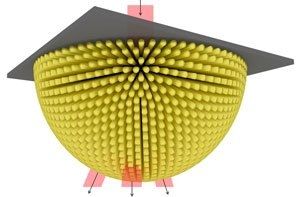A new day for imaging.
Optical microscopes that use lenses to bounce photons off objects have trouble distinguishing nanometer-scale objects smaller than the imaging beam’s wavelength, such as proteins and DNA. An innovative ‘hyperlens’ designed at A* STAR can overcome optical diffraction limits by capturing high-resolution information held by short-lived or evanescent waves lurking near a target’s surface.
Hyperlens devices — composed of thin stacks of alternate metal and plastic layers — have raised prospects for capturing living biological processes in action with high–speed optics. Key to their operation are oscillating electrons, known as surface plasmons, that resonate with and enhance evanescent waves that appear when photons strike a solid object. The narrow wavelengths of evanescent beams give nanoscale resolution to images when the hyperlens propagates the images to a standard microscope.
Mass-production of current hyperlenses has stalled however because of their intricate fabrication— up to 18 different layer depositions may be required, each with stringent requirements to avoid signal degradation. “For perfect imaging, these layers need precisely controlled thickness and purity,” says Linda Wu, from the A* STAR Singapore Institute of Manufacturing Technology. “Otherwise, it’s hard to magnify the object sufficiently for a conventional microscope to pick up.”
